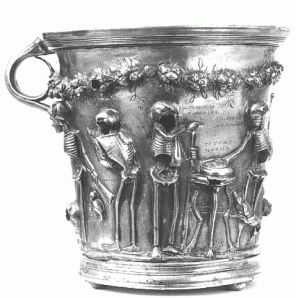If I have to choose between Platonic mathematicians telling me that reality doesn’t exist, and Epicurean philosophers telling me the sun may be the size of a basketball, I’ll live happily choosing the basketball, thank you.
 My title for this post is an overly elaborate way of setting the stage to quote an Epicurean argument from my favorite dialog of Lucian, Hermotimus. The selection ends with an attack on Platonic mathematics, and the point it makes is a great companion to Torquatus’ defense of Epicurus in Cicero’s De Finibus:
My title for this post is an overly elaborate way of setting the stage to quote an Epicurean argument from my favorite dialog of Lucian, Hermotimus. The selection ends with an attack on Platonic mathematics, and the point it makes is a great companion to Torquatus’ defense of Epicurus in Cicero’s De Finibus:
Perhaps an illustration will make my meaning clearer: when one of those audacious poets affirms that there was once a three-headed and six-handed man, if you accept that quietly without questioning its possibility, he will proceed to fill in the picture consistently—six eyes and ears, three voices talking at once, three mouths eating, and thirty fingers instead of our poor ten all told; if he has to fight, three of his hands will have a buckler, wicker targe, or shield apiece, while of the other three one swings an axe, another hurls a spear, and the third wields a sword. It is too late to carp at these details, when they come; they are consistent with the beginning; it was about that that the question ought to have been raised whether it was to be accepted and passed as true. Once grant that, and the rest comes flooding in, irresistible, hardly now susceptible of doubt, because it is consistent and accordant with your initial admissions. That is just your case; your love-yearning would not allow you to look into the facts at each entrance, and so you are dragged on by consistency; it never occurs to you that a thing may be self- consistent and yet false; if a man says twice five is seven, and you take his word for it without checking the sum, he will naturally deduce that four times five is fourteen, and so on ad libitum.
This is the way that weird geometry proceeds: it sets before beginners certain strange assumptions, and insists on their granting the existence of inconceivable things, such as points having no parts, lines without breadth, and so on, builds on these rotten foundations a superstructure equally rotten, and pretends to go on to a demonstration which is true, though it starts from premises which are false.
Just so you, when you have granted the principles of any school, believe in the deductions from them, and take their consistency, false as it is, for a guarantee of truth. Then with some of you, hope travels through, and you die before you have seen the truth and detected your deceivers, while the rest, disillusioned too late, will not turn back for shame: what, confess at their years that they have been abused with toys all this time? So they hold on desperately, putting the best face upon it and making all the converts they can, to have the consolation of good company in their deception; they are well aware that to speak out is to sacrifice the respect and superiority and honor they are accustomed to; so they will not do it if it may be helped, knowing the height from which they will fall to the common level. Just a few are found with the courage to say they were deluded, and warn other aspirants. Meeting such a one, call him a good man, a true and an honest; nay, call him philosopher, if you will; to my mind, the name is his or no one’s; the rest either have no knowledge of the truth, though they think they have, or else have knowledge and hide it, shamefaced cowards clinging to reputation.

